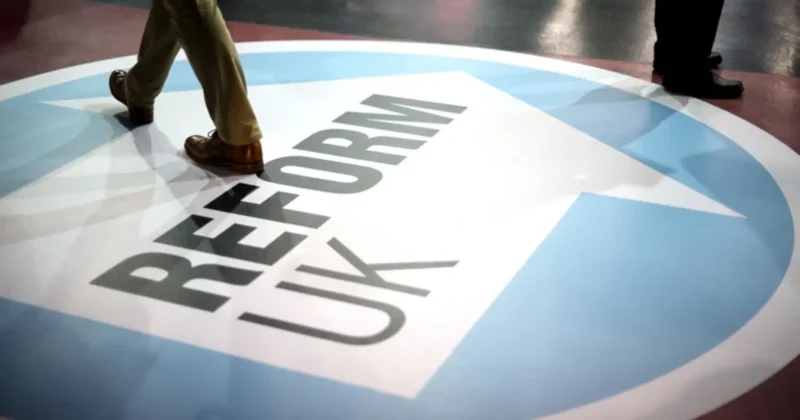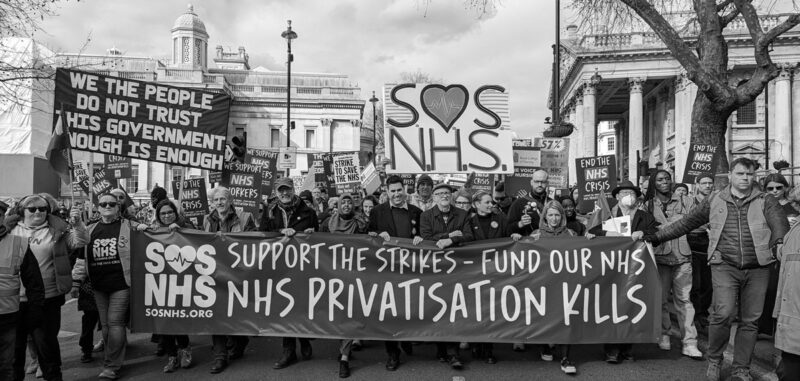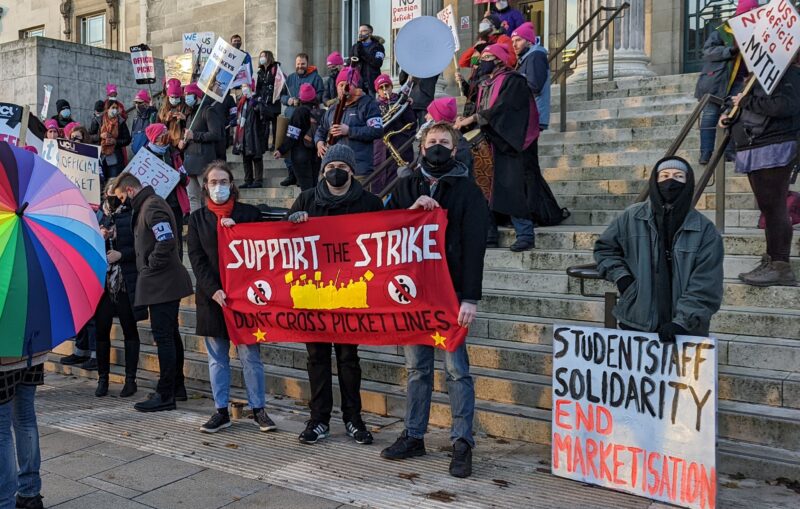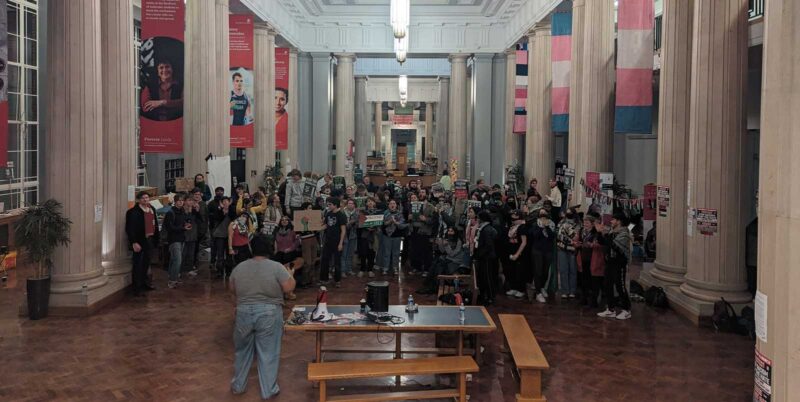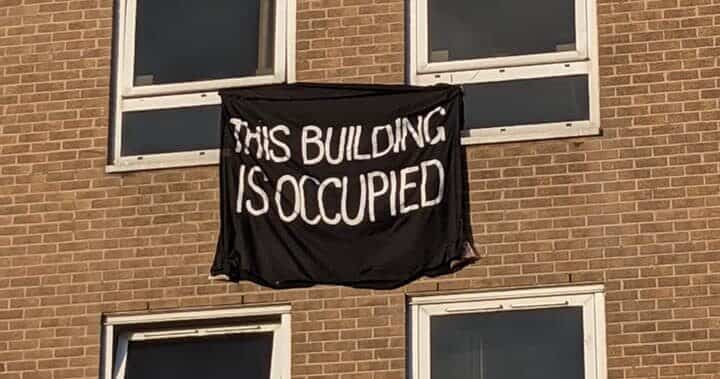Education not for sale
 Public education is under attack. Greedy corporations are hell bent on getting their hands on schools, colleges and universities – desperate to make a profit out of education and knowledge. This is having a terrible affect on young people, adult learners and education workers – as the market drives up costs, drives down standards and threatens many institutions with closure. The principle of free education for all for as long as people wanted it is dead – killed by New Labour, Liberals and the Tories.
Public education is under attack. Greedy corporations are hell bent on getting their hands on schools, colleges and universities – desperate to make a profit out of education and knowledge. This is having a terrible affect on young people, adult learners and education workers – as the market drives up costs, drives down standards and threatens many institutions with closure. The principle of free education for all for as long as people wanted it is dead – killed by New Labour, Liberals and the Tories.
Here we outline the problems of creating a market in education and what we can do to halt the reforms and launch a fight back for a better kind of education, fully funded and available for all.
Markets in Higher Education – what does it mean for you?
Among student activists there is lots of talk of the evils of “marketisation” and “commercialisation” of education. But what does it actually mean for ordinary students? Here are a few reasons why you should oppose the government’s latest White Paper, hypocritically called Students at the Heart of the System, and support the demonstration on the 9 November.
• University for the rich
With the abolition of the ceiling on student fees and with £7,500 to £9,000 becoming the norm, student numbers are expected to drop. Instead of high quality universal education for all, there will be growing inequality between the “top” institutions that have a mainly upper and middle class intake, and those at the bottom of the pile.
• Business takeover
Going to university is now an economic choice – it’s going to become much less about what you want to study and learn and much more about how it will help you into the job market afterwards. Universities are already responding to this by really tailoring their courses to what businesses want.
At institutions with a large working class intake this means, out with academic subjects and in with vocational. At the top universities there is more and more private sector control over research and teaching. Universities will be less and less places to broaden horizons and more and more places where money is everything.
• Privatisation
Lots of universities responded to the abolition of the tuition fee cap by charging at the top end of what could be covered by student loans (£9,000).
The government was taken by surprise. In response they want to give degree granting powers to more and more institutions, particularly private companies, who are prepared to charge much less and deliver much less for students. This isn’t about helping poor students, it’s about degrees on the cheap provided by companies with no academic standards.We have to keep on battling for free and universal, publically funded education.
• Cuts and closures
Today, the funding crisis as a result of central government cuts is the driving force for the pro market changes. Some institutions, particularly those which take a lot of working class students, are likely to be forced to cut budgets and close courses.
The government does not want to tax big business (who benefit from a well educated workforce) or the rich so cuts are being forced through to weed out ‘weaker’ universities who are supposedly uncompetitive.
Students take to the streets again – all out on 9 November
The student movement of last year changed the political landscape in Britain. By showing it was possible to fight back against government policies, the students inspired a wave of resistance.
This year students need to come out in force again – this time as part of a wider movement of resistance to the cuts and privatisations of this Tory government.
On the 9 November students will take to the streets in a national demonstration against cuts and privatisation, and for free education and jobs. It will be great opportunity to build momentum in the run up to the 30 November day of strike action when millions of workers will be out.
At the colleges and on campuses we need to redouble efforts to draw in large numbers of students in our education campaigns, as well as build links with the wider movement in the trade unions.
We need slogans and demands that tap into the enormous feeling of anger against this Tories and what they are doing to Britain. It’s not just about £9,000 fees anymore – it has to be about the kind of society we want to live in, a fightback for jobs and public services funded by taxing the rich.
Crucially we need to attack the idea that state run services are bad and privately run services are good, and challenge the idea that an ever greater encroachment on our lives by big business is inevitable. The government is determined to destroy the vision of education as a space for critical thinking and a means to improve our lives, as it ushers in a takeover by big business.
We can’t let it happen.
We have to fight, because if we don’t then what we stand to lose will be enormous.
We need Education Assemblies!
In London the Education Assemblies that organised the protests in 2010 are a model to follow. They can help us overcome the divisions in the student movement, and provided a democratic space for us to organise.
Over a hundred people would pack into the University London Union to discuss strategy and tactics – all of the successful mobilisations were organised through the Assembly.
There was a debate over whether education workers should join them – yes they should. We want to unite students and workers in education, not divide them. Student need to be organised in the Natioanl Campaign Against Fees and Cuts whilst education staff should be in ther trade unions and join rank and file organisations.
Further Education cuts
FACT: Further Education cuts amount to around £650 million. FE cuts disproportionately affect adult learners and poorer people because they make up most learners at FE colleges
Academies: the privatisation of our schools
TEN YEARS on from the first academy opening, there are now 1,300 academies in England. This may seem a small number – there are after all 24,000 state, or maintained schools. But it is the rate of expansion – 1,100 of these have converted in the last 18 months and 575 more are in the pipeline – that is worrying parents, teachers, educationalists and, increasingly, school students.
Essentially, academies are privatised schools. Instead of the Department for Education (DfE) funding elected councils, which then allocate funds to schools on the basis of need and for resources – such as special needs provision, ethnic minority support, teacher training, literacy and numeracy support – to be shared, the Education Secretary gives the money directly to academies.
This doesn’t sound like privatisation but it is a huge step in this direction – in a very similar way to how the Tories are breaking up the NHS by handing over budgets to GPs. And we need to raise as big a campaign to save public education services as the one to save the NHS.
Like doctors, academies have to buy in all the services they would usually receive from local authorities. Year-on-year cuts to school budgets, regardless of initial grants (bribes) new academies currently count on, will force them to seek the cheapest services available.
Multinational education service companies are already eyeing up this profitable new market and aggressively targeting academies. VT Education, for example, openly aims to run 1,000 schools by 2015. Education Secretary Michael Gove has said he favours for-profit companies moving in.
In the USA, where privatisation has a longer history, such companies run dozens of schools, raking in tens of millions of dollars a year. But they are increasingly involved in lawsuits over falling standards and fraudulent school rolls. Money that should be spent on quality education for all is lining shareholders’ pockets and paying for lawyers’ fees.
Alarmingly, academies are not accountable under the Freedom of Information Act and Gove has been recently caught trying to hide information through the use of private emails for departmental business. Could we be sleepwalking into a US-style nightmare?
That’s why we say, “Our schools are not for sale!”
The academy project has already gone too far. Some schools have gallantly fought off academy status, but it is the government’s agenda to turn every school into an academy. For this reason it is not enough to simply defend each school, one by one – it will require a mass campaign for well-funded, nationalised education for all.
Case study: Mossbourne Academy
Schools that have become academies have had varying success. One of the most successful, the Mossbourne Academy in Hackney, is lauded by Michael Gove as the model.
Its results are undoubtedly good, with 83% of pupils receiving A*-C grade at GCSE, with maths and English, as well as four students into Oxbridge this year. But Mossbourne has not won these results on a level playing field. It has resorted to:
• Training for exams
Mossbourne concentrates above all other teaching on preparing students for exams. But this distorts young people’s education and narrows their options. School League Tables count for more than each individual child’s needs.
• Tough discipline
There is zero tolerance on the school uniform code, which the Head teacher claims improves academic and artistic expression. But “former staff and some children speak of a chilly atmosphere, and make not entirely jokey references to the ‘prison camp’.” (School Wars p.108)
• Selection
Like many of the new academies and free schools, Mossbourne claims to be comprehensive. But the number of pupils eligible for free school meals (i.e. from families with less than £16,000 income) halved in its first year compared to the school it replaced. The number of students for whom English is not their first language (EAL) is well below the Hackney average.
It has recently emerged that Mossbourne uses its waiting list to encourage poorer families to look elsewhere, while telling “professional” parents their children stand a better chance of entry into the school.
Academies are all too often “successful” only because they exclude the children who face more problems: poverty, learning difficulties, racism, etc. The end result is not improved education for all, but a two tier school system, with academically successful schools for the middle classes and sink schools for the rest.
Who runs academies?
At present, schools are run by elected Boards of Governors, who are in turn accountable to the local council and the DfE. There are typically around 24 governors, elected by parents, staff, the local authority and the community. They can be changed regularly and new candidates can come forward. Similarly, we can change policy and demand funding priorities through council elections.
But when schools become academies, the governors choose a Board of Trustees, which is then accountable to no one but the Secretary of State. There are no elections and no mechanism for removing them. Even if it takes a real struggle to change council policy or bring about change through governors, academies really are answerable to no one – so much for parent power!
As socialists, we believe schools should be run democratically by parents, students and education workers themselves. Nationally agreed standards must apply including a pledge to combat social inequality, racism, sexism and all the socials evils stemming from capitalist society. How each school interprets, moulds and adopts these should be locally decided. Not only would this provide real choice in every school, it would educate young people in the tasks of taking control of their lives and fighting inequality and exploitation – the real purpose of education.
An attack on teachers
Once a school leaves the local authority, the national pay and conditions for teachers and support staff goes out the window, replaced by whatever terms the Board of Trustees imposes. Claims that TUPE legislation protects these on transfer to the new employer are deeply flawed, as the academy can rip up staff contracts any time it wants.
On top of this, Academies can refuse to recognise the unions, as has happened at the RSA Tipton Academy in Sandwell. Free schools – effectively academies set up from scratch – are even allowed to use non-qualified teachers.
Lord Hill recently wrote to heads, strongly hinting that “ministers might even turn down schools for academy status if they declared themselves happy to stick with national pay agreements” (Guardian 19.04.11).



